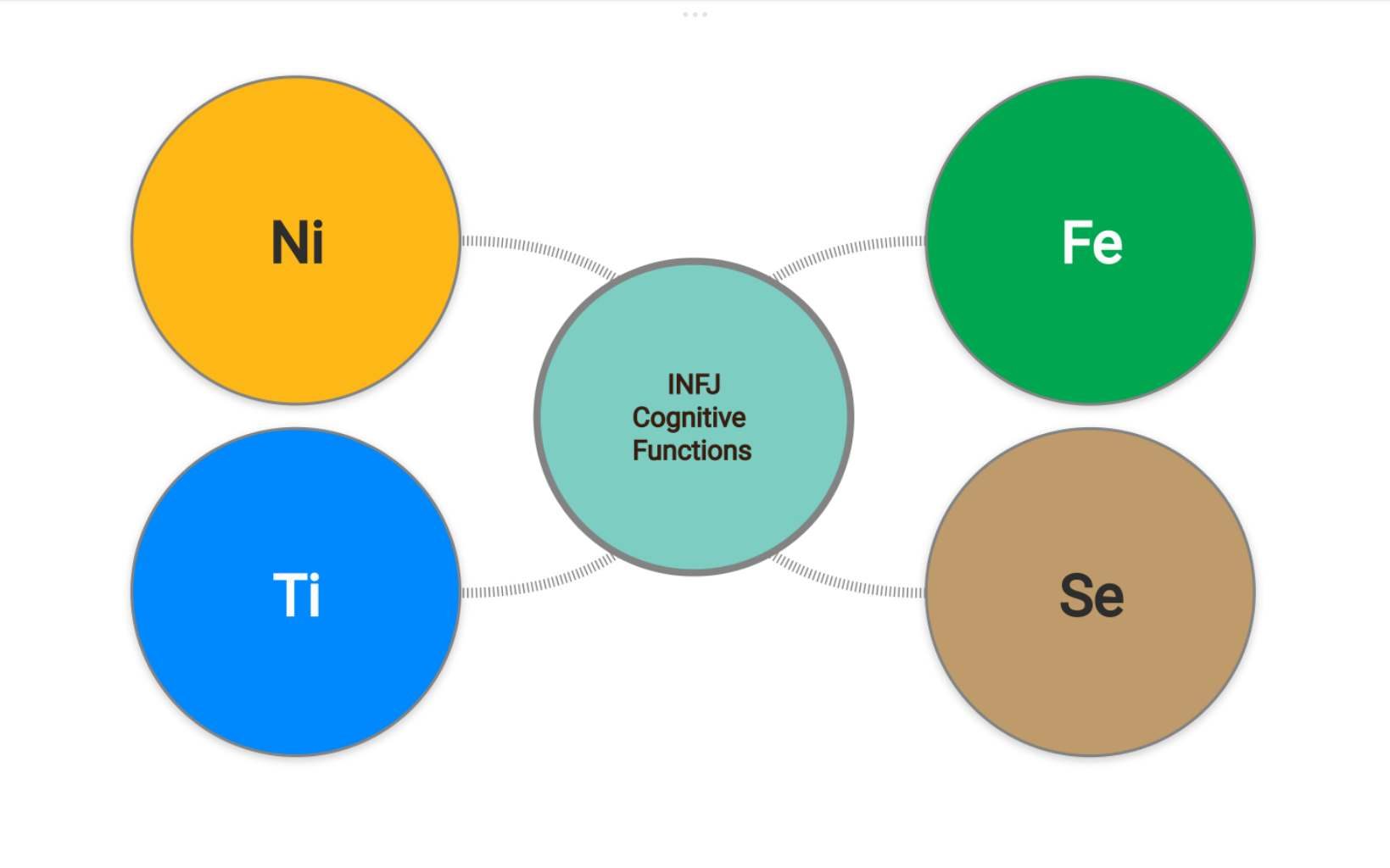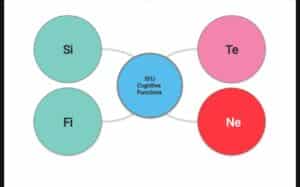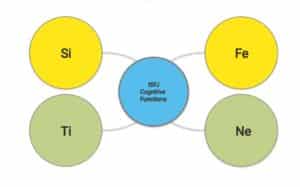Reading Time: 15 Minutes
Let’s talk about something fascinating yet often misunderstood: INFJ cognitive functions. You might be wondering, “What on earth are cognitive functions, and why should I care?” Well, imagine you have a superpower hidden inside your brain. INFJ cognitive functions are like that—special abilities that shape how INFJs think, feel, and interact with the world. These functions explain why INFJs are such unique and intriguing individuals. So, buckle up, and let’s dive into the mind of an INFJ. Trust me, it’s a wild and wonderful ride!

What are Cognitive Functions?
Alright, let’s break it down. Cognitive functions are like the different gears in your brain’s engine. They’re the ways our minds process information and make sense of the world. Imagine you have a toolbox in your head, and each tool helps you think and act in certain ways. In the world of the Myers-Briggs Type Indicator (MBTI), there are eight different cognitive functions, but each personality type, like the INFJ, uses four main ones. These functions help explain why we think, feel, and behave the way we do. So, let’s dig into the toolbox of the INFJ and see what we find.
The Four Main Cognitive Functions of INFJs
1. Introverted Intuition (Ni) – The Dominant Function
Introverted Intuition, or Ni, is the star player for INFJs. Think of Ni as a fortune-teller in the brain. It’s always looking ahead, spotting patterns, and imagining future possibilities. INFJs with strong Ni can seem like they have a sixth sense about things. They connect the dots in ways that others might miss and often have a gut feeling about how things will turn out.
For example, an INFJ might walk into a meeting and just know that a project will hit a snag two months from now. It’s like their brain is always playing a game of “connect the invisible dots.” This makes them great at planning and strategizing but can also lead to overthinking and worrying about the future.
2. Extroverted Feeling (Fe) – The Auxiliary Function
Next up, we have Extroverted Feeling, or Fe. Fe is like the social butterfly in the INFJ’s mind. It helps them tune into other people’s emotions and needs. INFJs use Fe to create harmony and make sure everyone feels understood and valued. They’re the ones who remember your birthday, notice when you’re down, and go out of their way to make you feel better.
Imagine an INFJ friend who always knows just the right thing to say to cheer you up. That’s their Fe at work. This function makes INFJs great friends and empathetic leaders, but it can also make them sensitive to conflict and overly concerned with making everyone happy.
3. Introverted Thinking (Ti) – The Tertiary Function
Introverted Thinking, or Ti, is the logical analyzer in the INFJ’s brain. Ti loves to dive deep into complex problems and figure out how things work. It’s like having a mini-scientist in your head, always questioning and fine-tuning ideas. INFJs use Ti to build internal frameworks and understand things on a deeper level.
For instance, when an INFJ is trying to understand a new concept, they’ll break it down piece by piece until it makes sense. They might spend hours researching a topic just to make sure they really get it. This makes them excellent problem solvers, but sometimes they can get stuck in their heads, debating every little detail.
4. Extroverted Sensing (Se) – The Inferior Function
Finally, there’s Extroverted Sensing, or Se, the least developed function for INFJs. Se is all about being in the moment and experiencing the world through the five senses. It’s like having a little adventurer in your mind, urging you to go out and enjoy life’s pleasures. INFJs use Se to engage with their surroundings and take in the details of the present moment.
Picture an INFJ at a concert, fully immersed in the music, feeling every beat and soaking up the atmosphere. That’s Se in action. While Se can help INFJs enjoy life more, it’s also the function they struggle with the most. They might find it hard to stay present and often feel overwhelmed by too much sensory input.
In summary, these four cognitive functions—Ni, Fe, Ti, and Se—work together to shape the INFJ’s unique perspective and behavior. They explain why INFJs can seem like intuitive, empathetic masterminds one moment and thoughtful, detail-oriented analysts the next. Understanding these functions can help you appreciate the complexities of the INFJ mind and maybe even cut them some slack when they’re off in their own world.
You Might Like To Read: INTJ Cognitive Functions (NiTe/FiSe): All 4 Functions Explained in Very Simple Manner
INFJ Cognitive Function Dynamics
Alright, let’s talk about how these cognitive functions play together in the INFJ mind. Imagine your brain as a well-oiled machine, with each function being a crucial part of the process. Sometimes they work harmoniously, and other times, well, they might bicker like siblings. Here’s a simple breakdown of how these functions interact in the INFJ’s head.
Interaction of Functions
Picture a group project at school. The team consists of Introverted Intuition (Ni), Extroverted Feeling (Fe), Introverted Thinking (Ti), and Extroverted Sensing (Se). Ni is the group leader, always dreaming up big ideas and seeing the bigger picture. Fe is the team’s social coordinator, making sure everyone gets along and feels included. Ti is the detail-oriented analyst, diving into the nitty-gritty to ensure everything makes sense. Lastly, Se is the fun-loving team member who wants to bring those ideas to life and enjoy the experience.
When these functions work well together, the INFJ can achieve amazing things. Ni dreams up a brilliant project idea, Fe rallies the team and ensures everyone’s on board, Ti fine-tunes the details, and Se makes sure the project is not only completed but also enjoyable. It’s like watching a well-choreographed dance.
But, sometimes the functions can clash. Ni might get so caught up in future possibilities that it ignores the present moment, frustrating Se. Fe might bend over backwards to please others, while Ti insists on sticking to the logical plan. These little spats can make the INFJ feel torn between their head and heart, or between future dreams and present reality.
Growth and Development
Now, let’s talk about growth. Just like people, cognitive functions can develop over time. For INFJs, this means strengthening their weaker functions to become more balanced individuals. Imagine our group project team going through a few rounds of team-building exercises. Over time, Se learns to appreciate Ni’s big ideas without feeling overwhelmed. Ti starts to trust Fe’s instincts about people, and Ni learns to stay grounded in the present thanks to Se.
INFJs can work on this balance by intentionally engaging in activities that strengthen their weaker functions. For instance, practicing mindfulness can help them stay present (boosting Se), while logical puzzles can sharpen their Ti. This kind of growth helps INFJs become more adaptable and resilient.
Stress and Cognitive Functions
When INFJs face stress, their cognitive functions can go haywire. It’s like watching our project team fall apart under pressure. Ni might go into overdrive, generating a flood of anxious future scenarios. Fe might overextend itself, trying to fix everyone’s problems and neglecting its own needs. Ti might become overly critical and nit-picky, while Se might either shut down or seek out risky behaviors to cope.
Understanding this dynamic can help INFJs recognize when they’re under stress and take steps to regain balance. It’s like giving their internal team a timeout to cool off and regroup. They might take a break to focus on self-care, talk things through with a friend, or simply remind themselves to stay grounded in the present.
In essence, the dynamics of INFJ cognitive functions are a complex yet fascinating interplay. When balanced, these functions enable INFJs to be insightful, empathetic, and innovative. When out of whack, they can make INFJs feel like they’re spinning their wheels. But with a little self-awareness and effort, INFJs can keep their cognitive team working smoothly, making the most of their unique strengths.
Practical Applications of Understanding INFJ Cognitive Functions
Understanding INFJ cognitive functions isn’t just for fun—it can actually make life a whole lot easier. Think of it as having a secret user manual for interacting with INFJs, whether you’re friends, colleagues, or even yourself. Here’s how this knowledge can be practically useful:
1. In Personal Relationships
Knowing about INFJ cognitive functions can really help in relationships. Picture this: you have an INFJ friend who seems to know what you’re feeling before you do. That’s their Extroverted Feeling (Fe) at work, picking up on your emotions and wanting to make you feel better. Understanding this can help you appreciate their empathy and avoid taking it for granted.
If your INFJ partner needs alone time to recharge, that’s their Introverted Intuition (Ni) needing space to think and process. Instead of feeling rejected, you can give them that quiet time, knowing they’ll come back refreshed and ready to connect. It’s like learning to dance with them instead of stepping on their toes.
2. In Career and Work
At work, understanding an INFJ’s cognitive functions can be a game-changer. INFJs are great at seeing the big picture (thanks to Ni) and empathizing with others (thanks to Fe). They’re natural planners and can often predict future trends or outcomes. So, if you have an INFJ on your team, let them brainstorm and plan. They’ll come up with innovative solutions and keep the team on track.
However, remember that their Extroverted Sensing (Se) might need some help with the day-to-day details. Pairing them with someone who loves handling logistics can create a dream team. This way, the INFJ can focus on strategy and vision while their partner handles the practical aspects.
3. In Personal Growth
For personal growth, INFJs can use their cognitive functions to better understand themselves. Realizing that their need for alone time (Ni) and desire to help others (Fe) are natural parts of who they are can be very empowering. They can work on balancing their logical side (Ti) and staying present (Se) to become more well-rounded.
INFJs might practice mindfulness to strengthen their Se, or engage in logical puzzles to sharpen their Ti. This balanced approach can help them navigate life more smoothly and reduce stress. It’s like fine-tuning an instrument to play the best music possible.
Common Misconceptions about INFJ Cognitive Functions
Despite the wealth of information out there, some myths about INFJs persist. Let’s debunk a few common misconceptions:
1. INFJs are Mystical Mind Readers
People often think INFJs are mind readers or have some magical intuition. While their Introverted Intuition (Ni) can seem almost psychic, it’s really about connecting the dots and seeing patterns. They aren’t peering into a crystal ball; they’re just very good at reading between the lines. So, don’t expect your INFJ friend to predict your future, but do appreciate their ability to understand complex situations.
2. INFJs are Always Altruistic and Selfless
Another myth is that INFJs are saintly do-gooders who never think of themselves. Sure, their Extroverted Feeling (Fe) makes them very caring and empathetic, but they have their limits. They can get overwhelmed if they give too much without taking time for themselves. Remember, INFJs need self-care too, and it’s okay for them to say no sometimes.
3. INFJs are Cold and Analytical
Some people might see the INFJ’s Introverted Thinking (Ti) as cold or detached. In reality, it’s just their way of making sense of things. INFJs use Ti to analyze and understand the world, but it doesn’t mean they lack emotion. It’s like having a quiet thinker inside who helps them figure stuff out. They’re still warm and caring; they just need their moments of logical clarity.
4. INFJs are Anti-Social
Because of their Introverted Intuition (Ni) and the need for alone time, some might label INFJs as anti-social. The truth is, they do enjoy socializing, but in smaller, meaningful doses. They aren’t the life of the party, but they cherish deep conversations with close friends. Think of them as selective socializers rather than party poopers.
Conclusion On INFJ Cognitive Functions
Understanding INFJ cognitive functions can feel like finding a secret map to the INFJ brain. It reveals why they’re such deep thinkers, empathetic friends, and insightful problem-solvers. By appreciating these functions, you can better understand and connect with the INFJs in your life—or if you’re an INFJ, understand yourself a bit more. So next time you encounter an INFJ, remember, they’re not just quirky or mysterious—they’re navigating the world with a complex and fascinating set of cognitive tools. And now, you’ve got the inside scoop on what makes them tick!
If you like the post, then please don’t forget to share with your friends.
Some Of The Previous Posts



